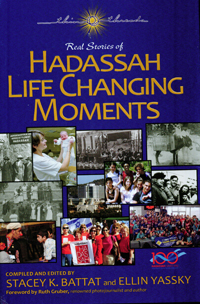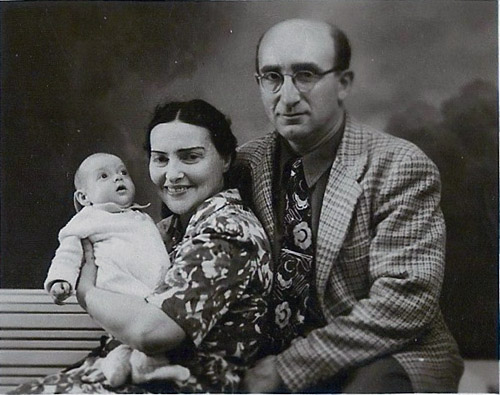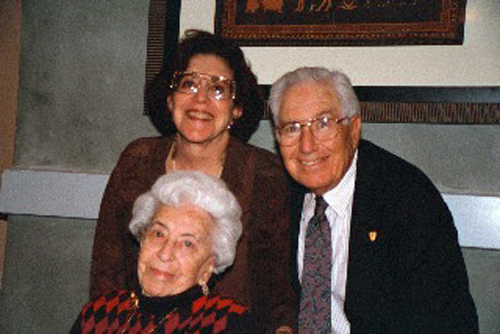 Editor’s Note: Tamara Greenspan Bennett of San Diego is among 101 authors in the anthology, Thin Threads: Real Stories of Hadassah Life Changing Moments, published by Hadassah in celebration of its centennial. Each of the stories is perhaps two or thee pages long, and the appendices of the book include biographical statements about all the authors as well as pictures and text covering a century of highlights in Hadassah’s history. The 463-page work was compiled and edited by Stacey K. Battat and Ellin Yassky, and contains a foreword by globe-girdling photojournalist Ruth Gruber.
Editor’s Note: Tamara Greenspan Bennett of San Diego is among 101 authors in the anthology, Thin Threads: Real Stories of Hadassah Life Changing Moments, published by Hadassah in celebration of its centennial. Each of the stories is perhaps two or thee pages long, and the appendices of the book include biographical statements about all the authors as well as pictures and text covering a century of highlights in Hadassah’s history. The 463-page work was compiled and edited by Stacey K. Battat and Ellin Yassky, and contains a foreword by globe-girdling photojournalist Ruth Gruber.
The stories often are quite emotional. Through Hadassah, for example, several authors came to love their Jewish identities; others met spouses; others met celebrities from the world stage; still others felt a cord of connection to their parents, grandparents and other relatives who, like them, labored in behalf of the women’s zionist organization, the hospitals it built in Israel, and Israel itself.
With the permission of the national Hadassah organization, Bennett has agreed to share her story with our readers. While no one story can encapsulate the range of a century’s worth of experiences of some one million Hadassah women, Bennett’s story does provide the flavor of the book. San Diego Jewish World is pleased to present it to you.
*
A Plea for Help
By Tamara Greenspan Bennett
In 1947, the family of a high school student in Queens, New York, received a letter from a man named Henry Ramet. The return address read simply, “Jewish Camp. Hallein bei Salzburg, Austria.” Hallein was a displaced persons camp. The author of the letter wrote that he desperately needed help to save the life of his newborn son and ailing wife.
While letters like this from survivors of the Shoah in Europe to American Jews were not unusual during this time in history, this one was. The Greenspan family in Queens had never heard of Henry Ramet.
In Poland, Henry Ramet had been a businessman, and his wife was a medical student. Then came the horrors of war. At the time he wrote the letter, the war was over and he and his family were living at a displaced person’s camp, where he served as the camp teacher. One of the few treats there was access to The New York Times. One day, the Times printed a list of New York State scholarship winners, and Henry, who knew little English, carefully chose one young man’s name and address. He was looking to find a Jewish family to ask for help.
Many letters of this type were written to American Jewish families; so many, in fact, that there were organizations to investigate these letters for authenticity. After checking the validity of the Ramet family’s needs, the young student’s mother made a decision. She and her mother-in-law met with members of their Hadassah chapter at the Jewish Center of Forest Hills West in Queens, New York. Under their guidance, they collected and sent baby formula, diapers, infant items, food, clothing, medical supplies, and other necessities needed for survival of the Ramet family. Eventually, they sent supplies to others in the camp. If Henry asked, they responded. That’s what Hadassah women do.

The Ramets and other families survived the horrid conditions of the DP camp, but the camps were temporary, and decisions had to be made. Those who had survived the war only to find their salvation in a DP camp, needed a new place to live. Israel was a choice. Many went. Others wanted to go to the United States or Canada. But those quotas were quickly filled.
Australia was accepting refugees, and in 1950, the Ramet family immigrated to Melbourne, Australia. As Henry wrote, “Some thought that Australia had milk flowing in the rivers and streets paved of gold.” Henry knew better. Life was very hard there and the Hadassah women continued to send supply packages to Australia and Israel as needed.
As time passed, Henry’s letters continued and the two families grew to become one. The Ramets’ little boy was now in school and wrote letters to “Dear Auntie.” He wrote to his “cousins” as well — they were his only family.
In 1975, almost thirty years after receiving the first letter to her scholarship-winning son back in 1947, Flora Greenspan fulfilled a dream. She flew to Australia to meet the Ramet family for the first time. The baby whose life she and her Hadassah sisters saved was now 28 years old. Flora had saved every letter Henry had sent over the years. Their friendship would continue past that emotional meeting, many years into the future. In 1987, Henry passed away, followed by his wife in 1993. Their son, Simon, his wife and children, remained in Australia, where they live today.

On February 22, 2002, Hadassah Southern California, San Diego honored my mother, Flora Beethoven Greenspan on the occasion of her 100th birthday, for her commitment to Hadassah, and for saving the lives of the Ramet family and many others at their time of need. It was Flora’s request that when she died, all of Henry’s letters be buried with her. She passed in September 2003, and her great-grandchildren honored her wish. It was truly a beautiful sight.
*
The book’s appendix says on page 383: “Tamara Greenspan Bennett, feels that Hadassah has been an important part of her life, from chapter president to region president to the first chair of Hadassah Southern California, San Diego. Previously, she has served on the National Board, HSC Cabinet and Executive Committee, and is currently PPAC, on both the national and local level. Tamara is currently on the HSC, San Diego Leadership committee. She is a Life Member and Keeper of the Gate. She was a lay volunteer of the Institutional Review Board of Children’s Hospital and now volunteers at Sharp Coronado Hospital. Tamara is married, has three children, five grandchildren, and is a five-generation Hadassah family.”
Pingback: Traveling through space with a dog--is it in our future? - San Diego Jewish World